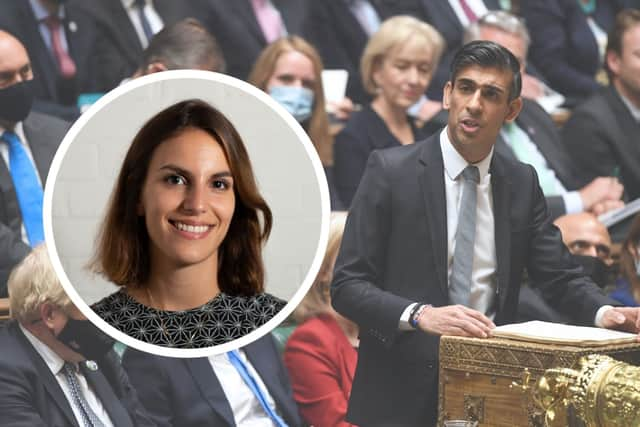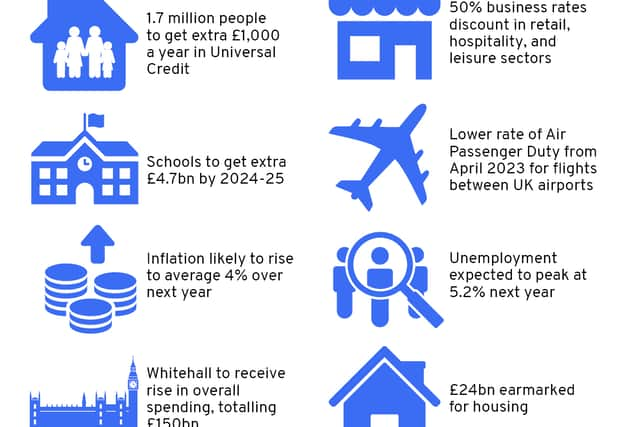Budget 2021 video analysis: how serious is Rishi Sunak about levelling up the UK?
This article contains affiliate links. We may earn a small commission on items purchased through this article, but that does not affect our editorial judgement.
and live on Freeview channel 276
There were no fewer than eight mentions of “levelling up” in Rishi Sunak’s hour-long Budget speech.
It’s become a mantra of Boris Johnson’s Government, to the extent that it has almost lost any real meaning - more of a branding strategy than a policy-based strategy.
Advertisement
Hide AdAdvertisement
Hide AdHowever, following the prime minister’s attempt to fill in some of the gaps at the Tory conference earlier this month, the Budget is when we get to hear the numbers behind the rhetoric.
Sunak was careful to bookend his turn at the despatch box with references to ‘levelling up’, and promised that this Budget “levels up to a higher-wage, higher-skill, higher-productivity economy”.
But does it really achieve that? We spoke to Valentine Quinio, analyst at the Centre for Cities, to get her assessment.


Levelling up: ‘We need to see how this will play out’
In his section on the ‘levelling up’ agenda, the Chancellor pledged to allocate the first round of bids from the £1.7 billion Levelling Up Fund, as well as £560 million for youth services and £200 million to build or transform up to 8,000 community football pitches across the UK.
Advertisement
Hide AdAdvertisement
Hide AdAccording to Quinio, we need more detail from the Chancellor: “Levelling up was a clear, core component of the Chancellor’s speech, which was obviously a good thing. It was probably the most mentioned phrase in the whole speech and there was a clear acknowledgement on the need to level up the country.
“We’ve also heard about the Shared Prosperity Fund and a promise that it will match the EU levels of funding, although we need to see how this will play out and be distributed.
“So we need to see how this plays out in practice, and we need to see how it will be articulated with more devolution to local governments, and there was no clear indication of how this will be shared between a central approach and local government and more devolution.
“We’re hoping to see this in the Levelling Up white paper and we welcome the announcement that it will be published by the end of the year.”


Transport: ‘We need better intra-city connections’
Advertisement
Hide AdAdvertisement
Hide AdThe Chancellor talked about an “infrastructure revolution”, with the announcement of £5.7 billion investment to bring "London-style" transport to the cities and regions of the UK.
Again, Quinio argues that it’s all about how this spending is used: “The commitment on investment in rail and transport is a good thing. We know that better transport plays a key part in the levelling up agenda, partly because better transport helps connect workers to jobs and to businesses.
“So bringing London-style transport to the cities and regions of the UK which do not benefit from similar privileges is a good thing, and we need to see better connected, simpler and cheaper transport across city regions, so we welcome the £5.7 billion investment for cities and regions in particular - although for now it’s still unclear how this money will be allocated.
“On HS2 and Northern Powerhouse Rail, we need to be mindful of the fact that what really matters for levelling up the economy is not so much inter-city connections but it’s intra-city connections. So improving a number of places in the north and the Midlands will mean investing in city region transport.”
Education: ‘We need to help people retrain, reskill, upskill’
Advertisement
Hide AdAdvertisement
Hide AdEducation has been widely seen as the biggest loser in this Budget, with the £2 billion for post-pandemic recovery falling far short of the £10-15 billion called for by the former Government adviser Sir Kevan Collins.
Quinio believes there’s a risk of widening inequality as a result: “The UK was already a very unequal country pre-Covid and this is likely to have been worsened by the pandemic. The Chancellor was right to acknowledge that opportunities and where you spend the first 100 days matter enormously for what’s going to happen afterwards in terms of your chances of finding a job and good opportunities.
“So yes, we need more than £2 billion for education, but it’s more general, it’s all about investing in skills.
“We need to see more in terms of helping people to retrain, reskill, upskill, and the other thing that was missing in the speech was ‘green jobs’, and the fact that investing in skills will not just level up the country but will also provide the tools to find employment in a greener economy.”
Housing: ‘These promises fall short of what’s required’
Advertisement
Hide AdAdvertisement
Hide AdThe Chancellor vowed to build 180,000 new affordable homes and offer £5 billion to remove unsafe cladding - but this isn't new money and has already been called 'woefully inadequate'.
Quinio agrees with the critics on this issue: “These promises fall short of what’s required in the country. We know that we need to build approximately 300,000 houses a year if we are going to tackle the housing crisis, and we know that it’s a supply-side crisis driven by a shortage, particularly in the south east.
“It’s not just that the targets are lower than what’s needed; it’s also that there was no clear mention on where these houses will be built, and no direction that the focus needs to be on the greater south east.
“The other thing that was missing was clarity on where these houses will be built within a city. There was the announcement on more houses on brownfield land, which is a good thing, but we also know that we need to build houses generally that are more connected to existing public transport, to cut the carbon footprint, and that was not part of the speech.”
Wages: ‘More investment needed in skills’
Advertisement
Hide AdAdvertisement
Hide AdOne of the main pre-speech leaks was the rise in the National Living Wage to £9.50 per hour starting next year.
Quinio welcomes this, but points out that the underlying issues need to be addressed too: “Raising the National Living Wage is a quick win for the levelling up agenda, and we know it will have the biggest impact in the places that are crucial for the prime minister in winning the next election. When you look at the places that will benefit the most from this, four out of five are located in the north.
“The pay increase is good news for those struggling with the cost of living crisis, but the problem is that it does not address the reasons why these people live on low pay in the first place, and why there’s a lack of well-paid jobs in their local area.
“We need to see more investment in skills, innovation and infrastructure to address this.”
The climate crisis: ‘Going in the wrong direction’
Advertisement
Hide AdAdvertisement
Hide AdIn the week before COP26 there was very little mention in the Chancellor’s speech of the climate crisis - and one of the more eyebrow-raising announcements was a cut to air passenger duty on domestic flights.
Quinio says this sends the wrong message, at a time when we should be trying to encourage more sustainable forms of travel: “The announcements on net zero were quite light, and he didn’t really mention it in his speech. Looking at the detail of the spending review tells the same story.
“My take on this is that delivering net zero, and having a chance to achieve net zero emissions by 2050 will be all about incentives. What we see at the moment is that there will be more incentives to keep doing the things the way we do at the moment, whether that’s investing in road programmes, keeping fuel duty frozen or cutting passenger duty on domestic flights. All that goes in the wrong direction in terms of incentivising people to adopt lower carbon forms of transport.
“So when you compare the total amount spent on high carbon transport with lower carbon transport like active travel, cycling walking, all public transport, you see that there’s quite a big gap.
Advertisement
Hide AdAdvertisement
Hide Ad“This announcement on cutting air passenger duty the week before COP26 is quite a surprise, especially when you compare it to countries like France, which announced a few weeks ago that they’re looking to ban domestic flights where there’s an alternative by train under two and a half hours. You see there’s quite a big difference in incentives here.”
A message from the editor:
Thank you for reading. NationalWorld is a new national news brand, produced by a team of journalists, editors, video producers and designers who live and work across the UK. Find out more about who’s who in the team, and our editorial values. We want to start a community among our readers, so please follow us on Facebook, Twitter and Instagram, and keep the conversation going. You can also sign up to our email newsletters and get a curated selection of our best reads to your inbox every day.
Comment Guidelines
National World encourages reader discussion on our stories. User feedback, insights and back-and-forth exchanges add a rich layer of context to reporting. Please review our Community Guidelines before commenting.
